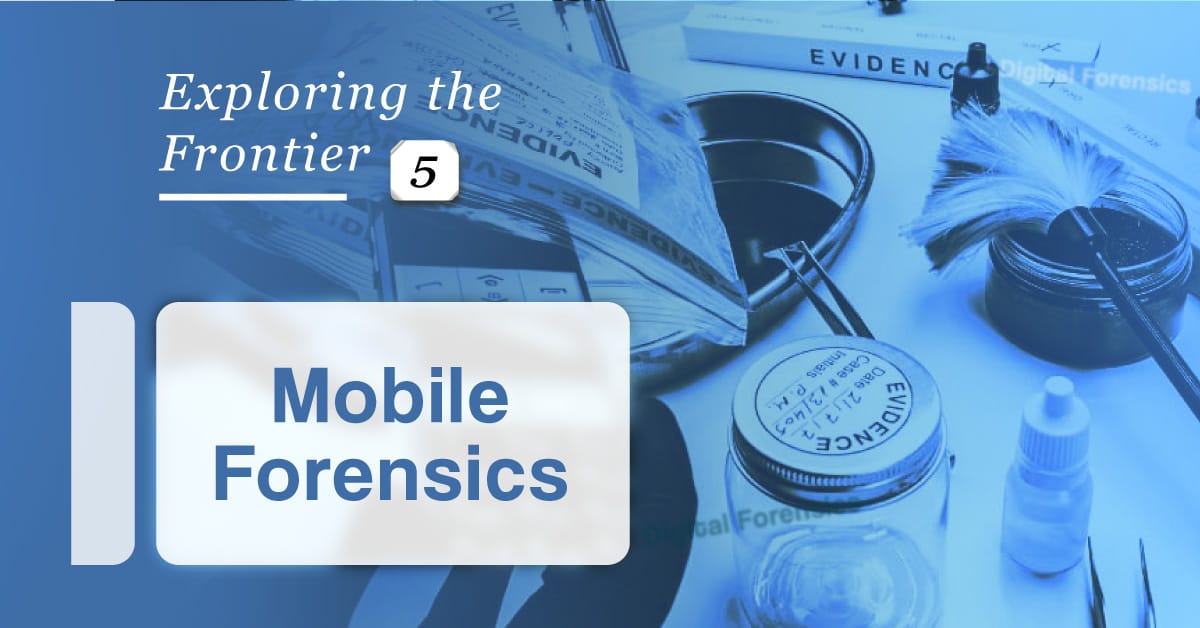Contributed by: Shari Onda, CFCE, GCFE, GISF, GASF, Forensic Analyst
This is the 5th article in our series about the Top 10 Digital Forensics Topics of 2024, and this week we take on Mobile Forensics!
In today’s digital age, mobile devices like smartphones and tablets have evolved into indispensable tools, permeating nearly every aspect of our lives. From communication and business operations to entertainment and personal management, these devices store an overwhelming amount of data, making them prime targets for digital investigations. As mobile technology continues to advance at a rapid pace, so too do the techniques and challenges in mobile forensics—the practice of recovering, analyzing, and preserving digital evidence from mobile devices.
The Rising Importance of Mobile Forensics
The explosion in the use of mobile devices has significantly increased the volume and complexity of data stored on them. This shift has made mobile forensics one of the most critical disciplines within the broader field of digital forensics. Law enforcement, legal professionals, and corporate investigators increasingly rely on mobile forensics to extract and interpret data that can be pivotal in both criminal and civil cases.
Mobile forensics is no longer a niche aspect of digital forensics; it is at the forefront of modern investigations. The diversity of data types stored on mobile devices—ranging from text messages and emails to GPS data and encrypted apps—makes these devices a central focus in digital investigations. Whether the case involves fraud, cyberstalking, intellectual property theft, or even terrorism, the ability to recover and analyze mobile data can make the difference between winning and losing a case.
Challenges in Mobile Forensics
Despite its growing importance, mobile forensics presents a host of challenges that require specialized expertise. One of the most significant obstacles is encryption. Modern mobile devices are equipped with sophisticated encryption protocols designed to protect user data. While these security measures are crucial for privacy, they also create significant barriers for forensic investigators who need to access encrypted data without compromising the integrity of the evidence.
The fragmentation of the mobile operating system landscape further complicates the process. With multiple versions of iOS, Android, and other operating systems in use, each with its own set of security features and data storage methods, forensic experts must be proficient in a wide range of technologies. Each mobile operating system and even each device model can require a unique approach to data extraction, making the work of mobile forensics specialists incredibly demanding.
Another challenge is the sheer volume of data stored on mobile devices. Unlike traditional computers, which typically store data in more structured formats, mobile devices hold a vast array of unstructured data types. Investigators often need to sift through vast amounts of information—from app data and browsing history to location services and social media activity—to find relevant evidence. This requires not only advanced tools but also a deep understanding of how to interpret the data in a meaningful way.
Advanced Techniques and Tools
To navigate these challenges, mobile forensic experts employ a variety of advanced techniques and tools. These include methods for bypassing device security, such as exploiting software vulnerabilities or using proprietary tools designed for forensic purposes. For example, some tools can extract data from locked or damaged devices, while others are capable of decrypting encrypted information without violating legal standards.
One of the most crucial aspects of mobile forensics is the preservation of data integrity. Forensic investigators must ensure that the data they recover is not altered in any way, as even minor changes can render the evidence inadmissible in court. This is where specialized forensic software comes into play. These tools allow investigators to create a bit-by-bit copy of a device’s storage, ensuring that the original data remains untouched while the analysis is conducted on the copy.
Moreover, forensic experts use advanced data analysis software to manage the vast amounts of information extracted from mobile devices. These tools can automatically categorize data, identify patterns, and even link related pieces of evidence, significantly speeding up the investigation process. For example, GPS data can be correlated with timestamps from messages or calls to reconstruct a suspect’s movements and activities at a specific time.
The Future of Mobile Forensics
As mobile technology continues to evolve, so too will the field of mobile forensics. The rise of the Internet of Things (IoT) and the increasing integration of artificial intelligence into mobile devices are likely to introduce new types of data and, consequently, new challenges for forensic investigators. For example, IoT devices that interact with smartphones may store data that could be crucial in an investigation, requiring forensic experts to develop new techniques for extracting and analyzing this information.
Additionally, as privacy concerns continue to grow, mobile device manufacturers are likely to implement even more robust security measures, making the job of forensic investigators increasingly tricky. This will require ongoing innovation in forensic tools and techniques, as well as continuous training for forensic professionals to keep up with the latest developments.
Understanding the capabilities and limitations of mobile forensics will become increasingly important in the legal and corporate worlds. As cases involving digital evidence become more common, having access to experts who are equipped with the latest tools and knowledge will be essential for success.
Conclusion
Mobile forensics is no longer a peripheral aspect of digital investigations; it is a critical field that is rapidly evolving alongside mobile technology. The ability to navigate the complexities of modern mobile devices, decrypt protected data, and piece together digital evidence is essential for anyone involved in legal or corporate investigations. As we move further into 2024, the need for advanced mobile forensic capabilities will continue to rise, making it one of the hottest and most challenging areas in digital forensics today.
Staying ahead in the field of mobile forensics requires a commitment to continuous learning and adaptation, by partnering with experts who possess the latest tools and techniques, legal and corporate professionals can ensure that they are fully prepared to meet the challenges of digital investigations in the years to come.







